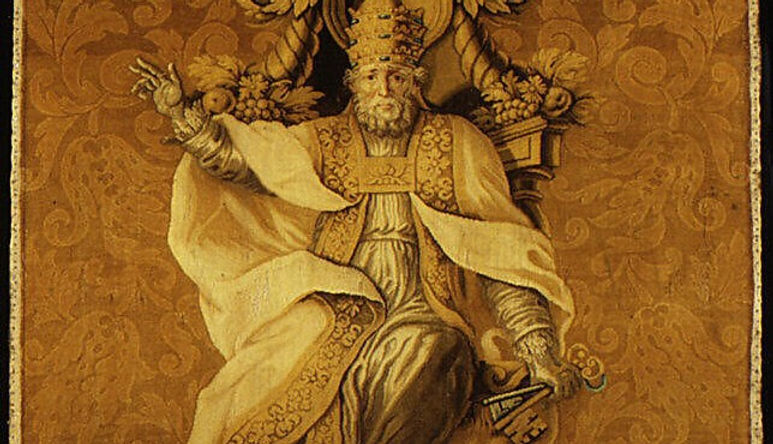Pope St. Zosimus
Apostolic See, Papal Authority, Foundation of the Church, St. Peter
“Although the tradition of the Fathers has assigned so great an authority to the Apostolic See, that no one may venture to call in question its judgment, and has maintained this always by its canons and rules, and though ecclesiastical discipline, as shown in the current of its laws, pays the reverence which it owes to the name of Peter, from whom likewise itself descends, for canonical antiquity, by the judgment of all, hath willed the power of this Apostle to be so great, from the very promise of Christ our God, that he can loose what is bound, and bind what is loosed; and an equal power is given to those who enjoy, with his consent, the inheritance of his see; for he has a care as well for all churches, especially for this, where he sat: nor does he permit any blast to shake a privilege or a sentence to which he has given the form and immovable foundation of his own name, and which, without danger to themselves, none may rashly attack: Peter then, being a head of such authority, and the zeal of all our ancestors having further confirmed this, so that the Roman church is established by all human as well as divine laws and discipline – whose place you are not ignorant that we rule and hold the power of his name – rather, most dear brethren, you know it, and as bishops are bound to know it; such then, I say, being our authority, that no one can question our sentence, we have done nothing which we have not of our own accord referred in our letters to your knowledge, , giving this much to our brotherhood, that by consulting together, not because we did not know what ought to be done, or might do something which might displease you as contrary to the good of the Church, but we desired to treat together with you of a man who, as you wrote, was accused before you, and who came to our see asserting his innocence, not refusing judgement from the former appeal; of his own accord calling for his accusers, and condemning the crimes of which he was falsely accused by rumour. We thought, in fact we know, that his entire petition was explained in the earlier letter which we sent you, and we believed that we had sufficiently replied to those you wrote in answer.
“But we have unfolded the whole roll of your letter which was sent by Subdeacon Marcellinus. You have understood the entire text of our letter as if we had believed Celestius in everything, and had given our assent, so to speak, to every syllable without discussing his words. Matters which need a long treatment are never rashly postponed, nor without great deliberation must anything be decided on which a final judgement has to be given. So let your brotherhood know that we have changed nothing since we wrote to you, or you wrote to us; but we have left all as it was before, when we informed your holiness of the matter in our letter, in order that the supplication you sent to us might be granted.” (Epistle 12, Quamvis Patrum traditio, to Aurelius and the African bishops at the synod of Carthage, the Council of Milevis, dealing with Pelagianism [A.D. March 21, 418].
“Great matters demand a great weight of examination, that the level of judgement be not less than the matters dealt with. In addition there is the authority of the apostolic see, to which the decrees of the fathers ordained a particular reverence in honour of S. Peter. We must therefore pray, and pray without ceasing, that by the continued grace and unceasing help of God, from this fountain the peace of the faith and of catholic brotherhood may be sent unclouded into the whole world.
“The priest Celestius came to us for examination, asking to be acquitted of those charges on which he had been wrongfully accused to the apostolic see. And although we were distracted by a great weight of ecclesiastical business, we put it all on one side, so that you would not have to wait for information, and we sat for the examination in the basilica of S. Clement, who was imbued with the learning of the blessed apostle Peter.
“We discussed all that had been done before, as you will learn from the acts attached to this letter. Celestius being admitted, we caused to be recited the pamphlet which he had handed in, and not content with this, we repeatedly inquired of him whether he spoke from his heart or with his lips the things which he had written.
“In the present case we have decided nothing hurriedly or immaturely, but we make known to your holinesses our examination upon the unfettered faith of Celestim. The earlier libellus, written by him in Africa, ought to be evidence in his favour against those who boast on unexamined rumours. Wherefore within two months either let those come forward who can show that he now belieues otherwise than the contents of his pamphlets and confession, or let your holinesses recognize nothing of doubt to be remaining in that which he henceforward openly and manifestly professes. I have therefore admonished Celestius himself, and other priests present at the time from various places, that these little snares of questions and silly contests, which do not build, but destroy, spring from that contagious curiosity which there is when each man abuses his naturaI capacity.” (Epistle 2, to Aurelius and the African Bishops, Magnum Pondus).

